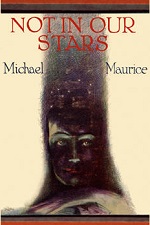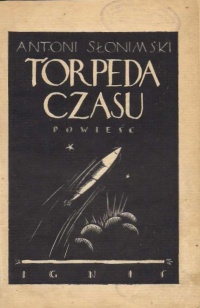|  
 
 | | | | 

| | Not in Our Stars
by Conrad Arthur Skinner (as by Michael Maurice)
First publication: 1923

After some scientific mumbo-jumbo, Felix Menzies wakes up in a jail cell on the day before his execution for murdering the man he wrongly thought was his wife’s lover, and then he starts waking up on each previous morning, whereupon he begins to think he can cheat Destiny by not murdering the guy. If he did meet Savile, he was prepared to shake hands with him in the old way, and to realize what a neurotic fool he had been: also that Destiny had made an idiot of itself with the careless blundering born of the knowledge that nobody would ever know, nobody, that is, except himself; and, of course, Destiny safely relied on the assumption that nobody would believe him. If he did meet Savile, he was prepared to shake hands with him in the old way, and to realize what a neurotic fool he had been: also that Destiny had made an idiot of itself with the careless blundering born of the knowledge that nobody would ever know, nobody, that is, except himself; and, of course, Destiny safely relied on the assumption that nobody would believe him. 
| |
| | | | |

 | | | | 

| | Torpeda czasu
English title: Time Torpedo (translated from Polish)
by Antoni Słonimski
First publication: Kurjer Polski (Nr. 281-352, Rok. XXVI), circa early October to mid-December 1923

 Torpeda czasu is important enough to list even though I’ve read only summaries, I’ve never found a translation, and I’m uncertain about the date. The notes accompanying this particular cover indicate a 1923 publication date, but elsewhere the date of 1924 is common, and Wikipedia has 1926. Never mind! Torpeda czasu is important enough to list even though I’ve read only summaries, I’ve never found a translation, and I’m uncertain about the date. The notes accompanying this particular cover indicate a 1923 publication date, but elsewhere the date of 1924 is common, and Wikipedia has 1926. Never mind!

The short novel’s heroes—Professor Pankton and his beautiful daughter Haydnee, historian Tolna, and journalist Hersey—set out from the year 2123 to change the Napoleonic Wars, starting with the French Revolution and aiming to fix matters so that mankind can advance intellectually without the hindrence of war. But the outcome, I am told, is even more miserable than the original bloody history.

Should I ever track down a copy, I shall need help from my Polish colleagues in computer science to translate the story to English. Nie zapominajcie, że to Francuzi, najwaleczniejszy naród europejski, że to są ludzie, których brawura i dzielność oślepia. Nie zapominajcie, że to Francuzi, najwaleczniejszy naród europejski, że to są ludzie, których brawura i dzielność oślepia.

[Do not forget that the French, bravest among all the European nationalities, are a people blinded by their very own braggadocio and past prowess.] 
| |
| | | | |

| |     |